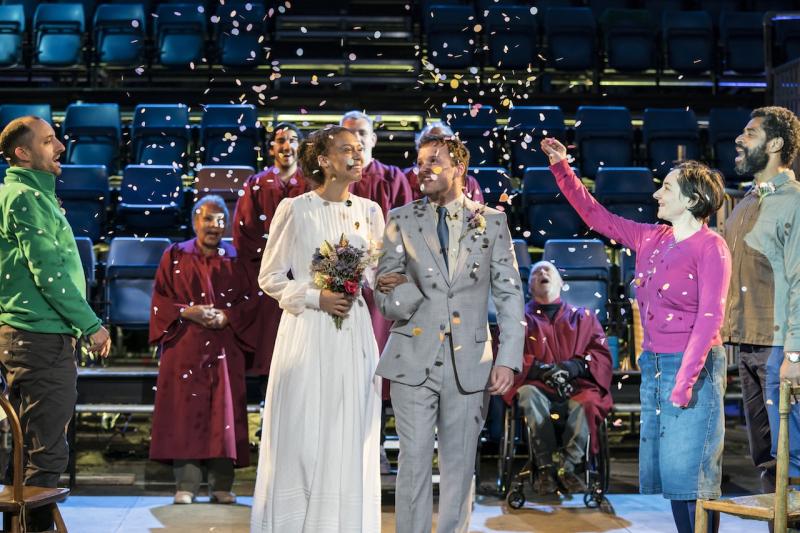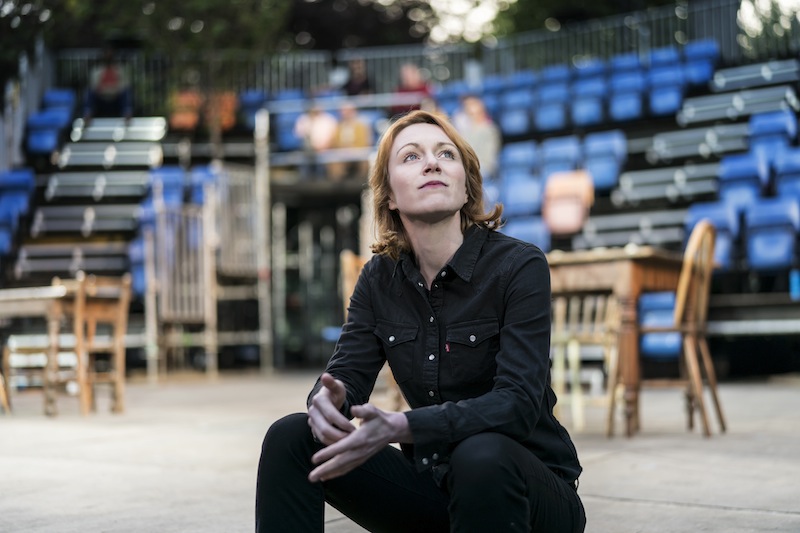Our Town, Regent's Park Open Air Theatre review – small-town tale that raises profound existential questions | reviews, news & interviews
Our Town, Regent's Park Open Air Theatre review – small-town tale that raises profound existential questions
Our Town, Regent's Park Open Air Theatre review – small-town tale that raises profound existential questions
A moving antidote to fast-paced narratives and rampant individualism

Our Town was written shortly before World War Two about a small town in America in the years leading up to World War One, yet it makes its extraordinary impact by focusing its lens on details as apparently unexciting as pond-water.
In the nature of the questions it raises about human existence the play anticipates It’s A Wonderful Life (1946), though its experimental form would eventually inspire Lars von Trier’s far more disturbing film about mob-violence, Dogville (2003). A meta-theatrical framing device means that the fictional New Hampshire town of Grover’s Corners is introduced as if on the bare boards of a theatre: Laura Rogers (pictured below) as the wryly philosophical Stage Manager gives the tour, introducing us to inhabitants both living and dead.
For the first two acts Ellen McDougall’s production presents the characters – in modern casual-wear – on the treadmills of their daily routines: people get up, have breakfast, go to school or work, gossip, and fret gently about the future. This is a tale with no sound or fury in a place where culture begins with Robinson Crusoe and ends with Whistler’s Mother, but it picks up pace as the precocious Emily reveals she is in love with her high-school friend, George.
The writer Thornton Wilder won a Pulitzer Prize for Our Town (one of three that he would be awarded in his lifetime), which was partly inspired by The Making of Americans, written by his friend and mentor Gertrude Stein. Here, as there, the focus is the joining of two quintessentially American families through marriage – though the tone shifts substantially when Emily dies in childbirth, and over the course of the third act, reflects on her existence from the graveyard.
It must be confessed, it initially feels like a curious choice to stage this in the Arcadian surroundings of Regent’s Park Open Air Theatre: both the narrative style and stark modernist aesthetic would seem more fitting in a studio theatre. Deliberate though it is, the slow-burn pace of the action can feel challenging, even if the performances are filled with wit and charm, not least from Francesca Henry as Emily and Pandora Colin as the long-suffering doctor’s wife. Yet we are in the hands of a playwright who knows precisely what he is doing. (For those tempted to write Wilder off as a slouch in the suspense department, it should be remembered that he wrote the first draft of the screenplay for Hitchcock’s highly successful Shadow of a Doubt.) That moment when we see Grover’s Corners from the perspective of the now dead Emily, a 26-year-old mother desperate to recapture each moment of joy she experienced there, is an existential jolt that prompts profound questions about what’s really important.
Yet we are in the hands of a playwright who knows precisely what he is doing. (For those tempted to write Wilder off as a slouch in the suspense department, it should be remembered that he wrote the first draft of the screenplay for Hitchcock’s highly successful Shadow of a Doubt.) That moment when we see Grover’s Corners from the perspective of the now dead Emily, a 26-year-old mother desperate to recapture each moment of joy she experienced there, is an existential jolt that prompts profound questions about what’s really important.
In a time that fetishises fast-paced narratives and rampant individualism, Our Town represents a moving and thought-provoking antidote. The sense, however, is that this is a production that still has room to grow. If the choral numbers, sung by the whole community, were stronger and the individual performances more assertive, the evening could pack a considerable punch. For when the sun eventually goes down, and the stars wink in the darkness as Emily asks us to contemplate our mortality, this setting finally comes into its own. Go with an open mind – and, this being a British summer, several layers of clothing – and you never know how your priorities will be affected.
The future of Arts Journalism
You can stop theartsdesk.com closing!
We urgently need financing to survive. Our fundraising drive has thus far raised £49,000 but we need to reach £100,000 or we will be forced to close. Please contribute here: https://gofund.me/c3f6033d
And if you can forward this information to anyone who might assist, we’d be grateful.

Subscribe to theartsdesk.com
Thank you for continuing to read our work on theartsdesk.com. For unlimited access to every article in its entirety, including our archive of more than 15,000 pieces, we're asking for £5 per month or £40 per year. We feel it's a very good deal, and hope you do too.
To take a subscription now simply click here.
And if you're looking for that extra gift for a friend or family member, why not treat them to a theartsdesk.com gift subscription?
more Theatre
 Macbeth, RSC, Stratford review - Glaswegian gangs and ghoulies prove gripping
Sam Heughan's Macbeth cannot quite find a home in a mobster pub
Macbeth, RSC, Stratford review - Glaswegian gangs and ghoulies prove gripping
Sam Heughan's Macbeth cannot quite find a home in a mobster pub
 The Line of Beauty, Almeida Theatre review - the 80s revisited in theatrically ravishing form
Alan Hollinghurst novel is cunningly filleted, very finely acted
The Line of Beauty, Almeida Theatre review - the 80s revisited in theatrically ravishing form
Alan Hollinghurst novel is cunningly filleted, very finely acted
 Wendy & Peter Pan, Barbican Theatre review - mixed bag of panto and comic play, turned up to 11
The RSC adaptation is aimed at children, though all will thrill to its spectacle
Wendy & Peter Pan, Barbican Theatre review - mixed bag of panto and comic play, turned up to 11
The RSC adaptation is aimed at children, though all will thrill to its spectacle
 Hedda, Orange Tree Theatre review - a monument reimagined, perhaps even improved
Scandinavian masterpiece transplanted into a London reeling from the ravages of war
Hedda, Orange Tree Theatre review - a monument reimagined, perhaps even improved
Scandinavian masterpiece transplanted into a London reeling from the ravages of war
 The Assembled Parties, Hampstead review - a rarity, a well-made play delivered straight
Witty but poignant tribute to the strength of family ties as all around disintegrates
The Assembled Parties, Hampstead review - a rarity, a well-made play delivered straight
Witty but poignant tribute to the strength of family ties as all around disintegrates
 Mary Page Marlowe, Old Vic review - a starry portrait of a splintered life
Tracy Letts's Off Broadway play makes a shimmeringly powerful London debut
Mary Page Marlowe, Old Vic review - a starry portrait of a splintered life
Tracy Letts's Off Broadway play makes a shimmeringly powerful London debut
 Little Brother, Soho Theatre review - light, bright but emotionally true
This Verity Bargate Award-winning dramedy is entertaining as well as thought provoking
Little Brother, Soho Theatre review - light, bright but emotionally true
This Verity Bargate Award-winning dramedy is entertaining as well as thought provoking
 The Unbelievers, Royal Court Theatre - grimly compelling, powerfully performed
Nick Payne's new play is amongst his best
The Unbelievers, Royal Court Theatre - grimly compelling, powerfully performed
Nick Payne's new play is amongst his best
 The Maids, Donmar Warehouse review - vibrant cast lost in a spectacular-looking fever dream
Kip Williams revises Genet, with little gained in the update except eye-popping visuals
The Maids, Donmar Warehouse review - vibrant cast lost in a spectacular-looking fever dream
Kip Williams revises Genet, with little gained in the update except eye-popping visuals
 Ragdoll, Jermyn Street Theatre review - compelling and emotionally truthful
Katherine Moar returns with a Patty Hearst-inspired follow up to her debut hit 'Farm Hall'
Ragdoll, Jermyn Street Theatre review - compelling and emotionally truthful
Katherine Moar returns with a Patty Hearst-inspired follow up to her debut hit 'Farm Hall'
 Troilus and Cressida, Globe Theatre review - a 'problem play' with added problems
Raucous and carnivalesque, but also ugly and incomprehensible
Troilus and Cressida, Globe Theatre review - a 'problem play' with added problems
Raucous and carnivalesque, but also ugly and incomprehensible
 Clarkston, Trafalgar Theatre review - two lads on a road to nowhere
Netflix star, Joe Locke, is the selling point of a production that needs one
Clarkston, Trafalgar Theatre review - two lads on a road to nowhere
Netflix star, Joe Locke, is the selling point of a production that needs one

Add comment